2021-2022学年人教版高中英语必修第一册语法点 定语从句 课件 (45张ppt)
文档属性
| 名称 | 2021-2022学年人教版高中英语必修第一册语法点 定语从句 课件 (45张ppt) | 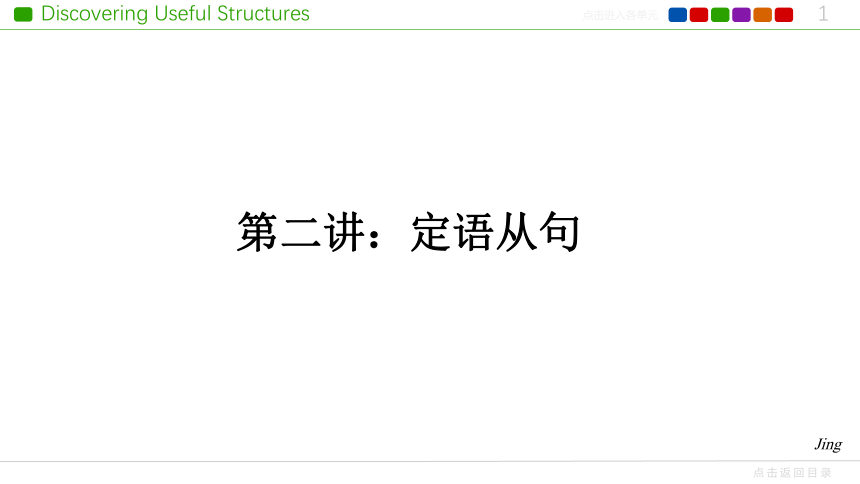 | |
| 格式 | zip | ||
| 文件大小 | 210.9KB | ||
| 资源类型 | 教案 | ||
| 版本资源 | 人教版(新课程标准) | ||
| 科目 | 英语 | ||
| 更新时间 | 2021-11-04 08:08:52 | ||
图片预览

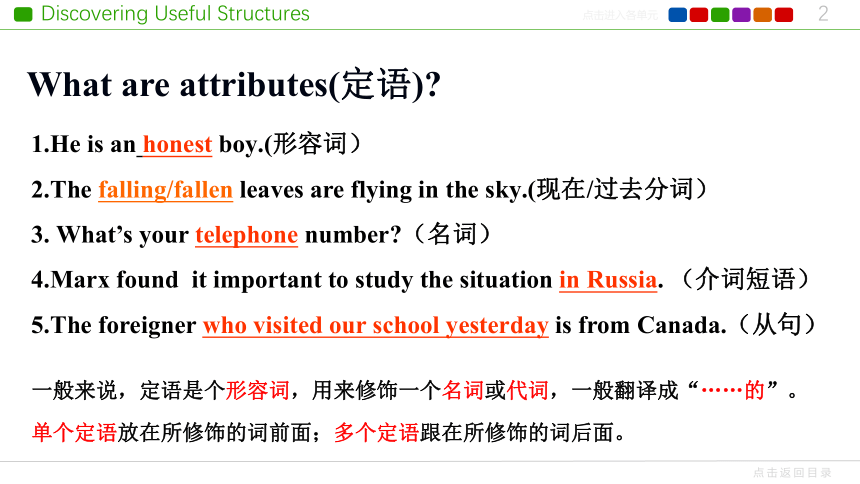
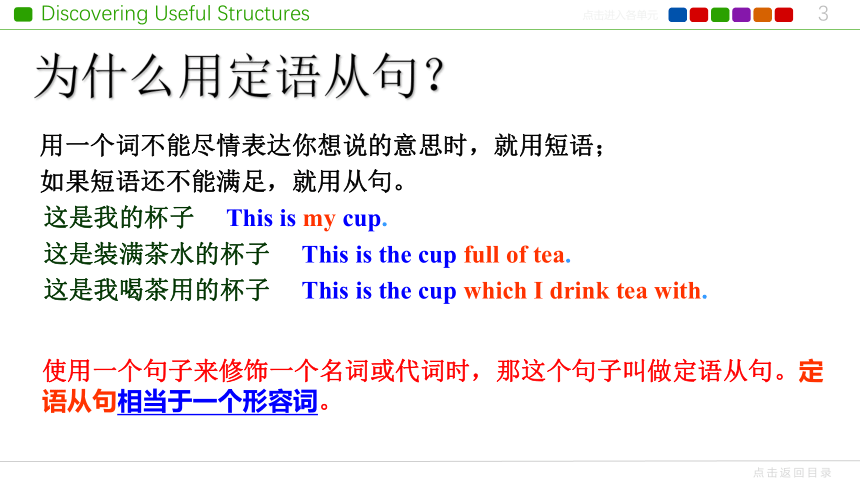
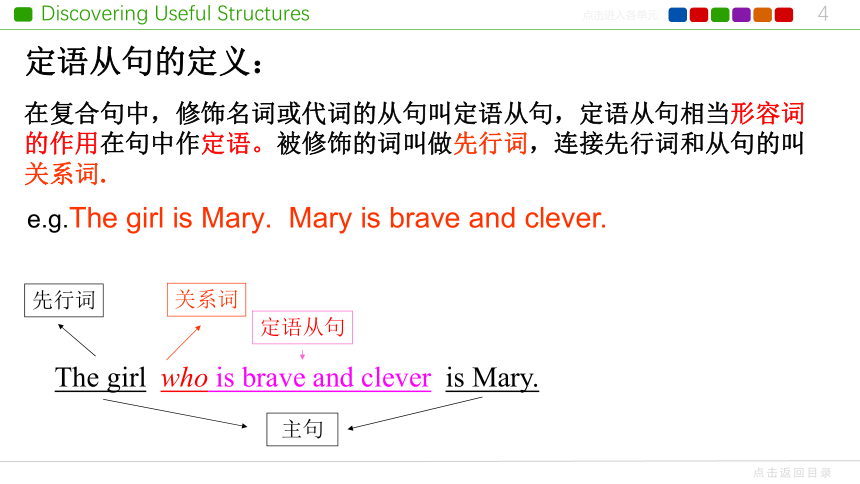
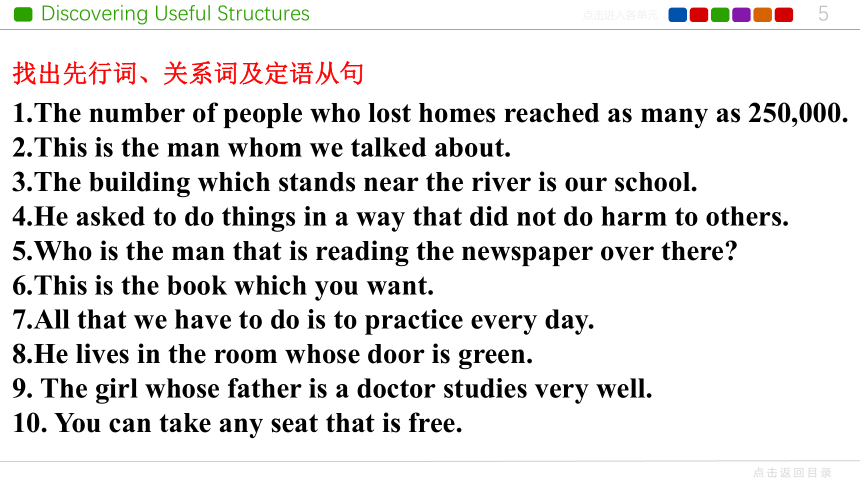
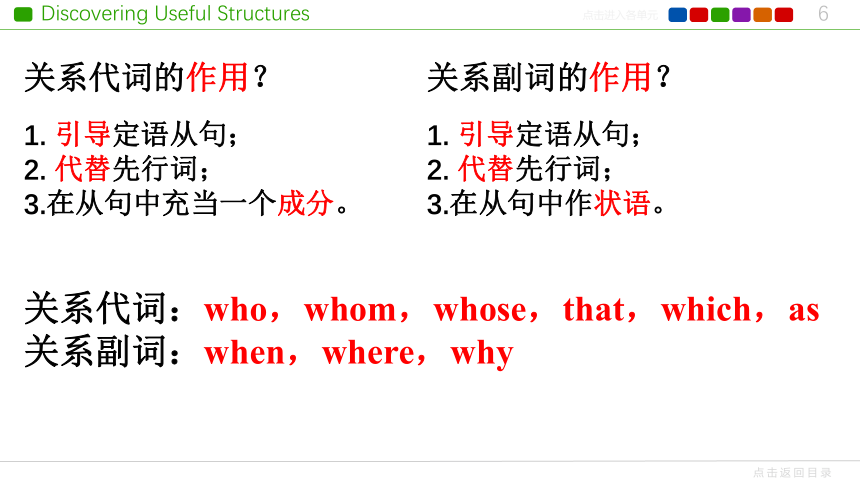
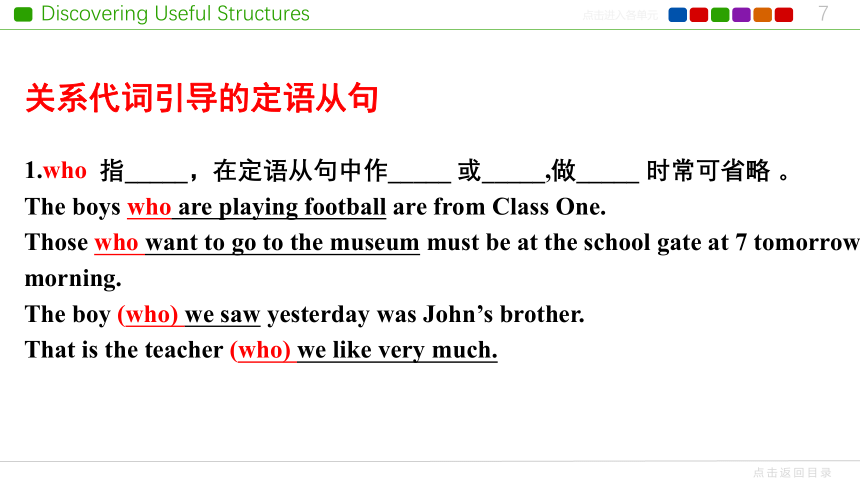
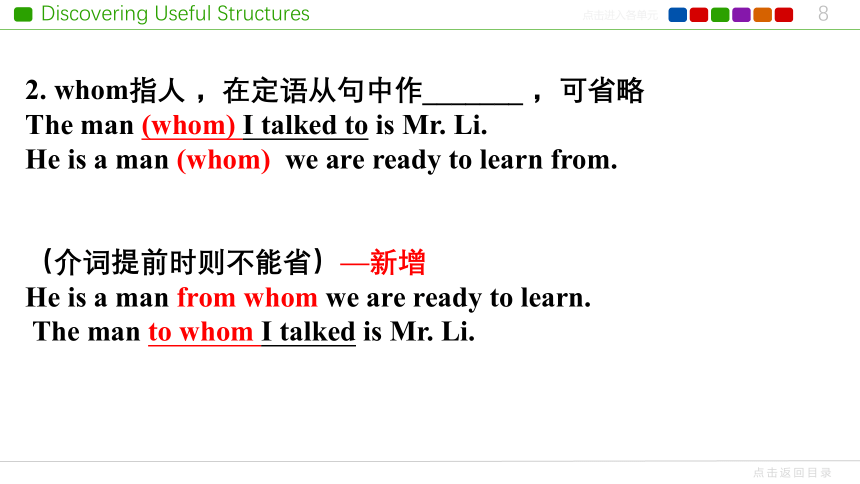
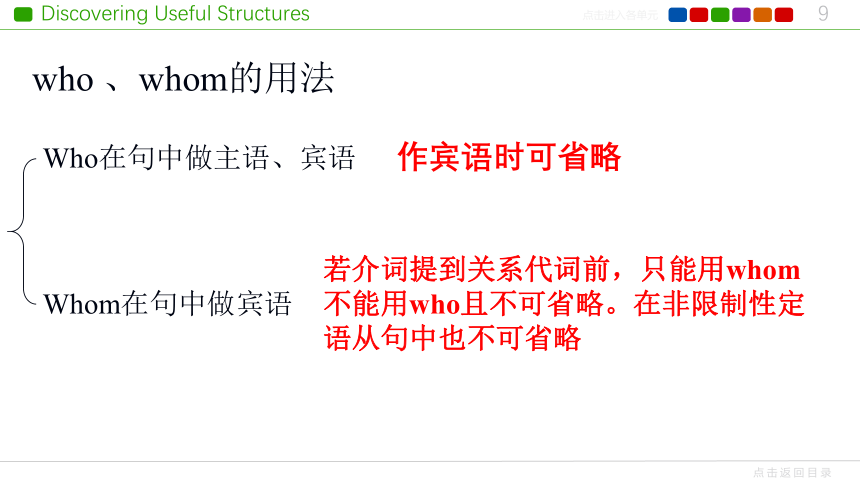
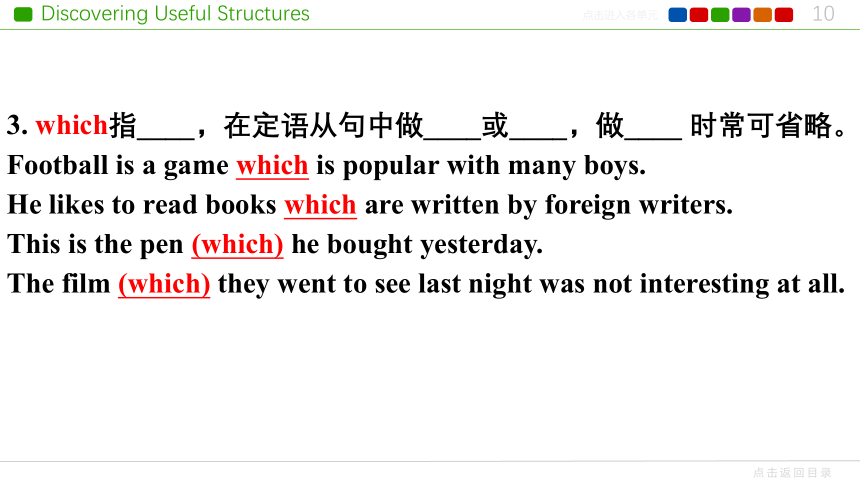
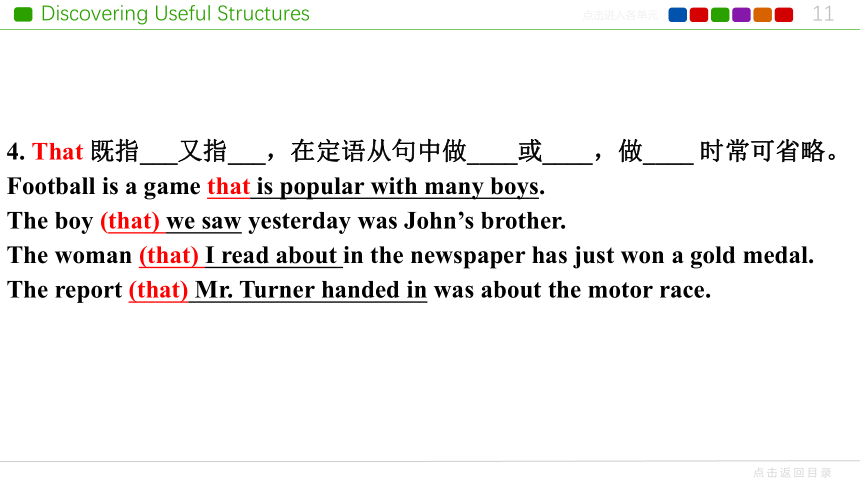

文档简介
(共45张PPT)
第二讲:定语从句
Jing
What are attributes(定语)
1.He is an honest boy.(形容词)
2.The falling/fallen leaves are flying in the sky.(现在/过去分词)
3. What’s your telephone number (名词)
4.Marx found it important to study the situation in Russia. (介词短语)
5.The foreigner who visited our school yesterday is from Canada.(从句)
一般来说,定语是个形容词,用来修饰一个名词或代词,一般翻译成“……的”。
单个定语放在所修饰的词前面;多个定语跟在所修饰的词后面。
为什么用定语从句?
用一个词不能尽情表达你想说的意思时,就用短语;
如果短语还不能满足,就用从句。
这是我的杯子 This is my cup.
这是装满茶水的杯子 This is the cup full of tea.
这是我喝茶用的杯子 This is the cup which I drink tea with.
使用一个句子来修饰一个名词或代词时,那这个句子叫做定语从句。定语从句相当于一个形容词。
定语从句的定义:
在复合句中,修饰名词或代词的从句叫定语从句,定语从句相当形容词的作用在句中作定语。被修饰的词叫做先行词,连接先行词和从句的叫关系词.
e.g.The girl is Mary. Mary is brave and clever.
先行词
关系词
The girl who is brave and clever is Mary.
定语从句
主句
1.The number of people who lost homes reached as many as 250,000.
2.This is the man whom we talked about.
3.The building which stands near the river is our school.
4.He asked to do things in a way that did not do harm to others.
5.Who is the man that is reading the newspaper over there
6.This is the book which you want.
7.All that we have to do is to practice every day.
8.He lives in the room whose door is green.
9. The girl whose father is a doctor studies very well.
10. You can take any seat that is free.
找出先行词、关系词及定语从句
关系代词的作用?
1. 引导定语从句;
2. 代替先行词;
3.在从句中充当一个成分。
关系副词的作用?
1. 引导定语从句;
2. 代替先行词;
3.在从句中作状语。
关系代词:who,whom,whose,that,which,as
关系副词:when,where,why
关系代词引导的定语从句
1.who 指_____,在定语从句中作_____ 或_____,做_____ 时常可省略 。
The boys who are playing football are from Class One.
Those who want to go to the museum must be at the school gate at 7 tomorrow morning.
The boy (who) we saw yesterday was John’s brother.
That is the teacher (who) we like very much.
2. whom指人 ,在定语从句中作_______ ,可省略
The man (whom) I talked to is Mr. Li.
He is a man (whom) we are ready to learn from.
(介词提前时则不能省)—新增
He is a man from whom we are ready to learn.
The man to whom I talked is Mr. Li.
who 、whom的用法
Who在句中做主语、宾语
Whom在句中做宾语
若介词提到关系代词前,只能用whom不能用who且不可省略。在非限制性定语从句中也不可省略
作宾语时可省略
3. which指____,在定语从句中做____或____,做____ 时常可省略。
Football is a game which is popular with many boys.
He likes to read books which are written by foreign writers.
This is the pen (which) he bought yesterday.
The film (which) they went to see last night was not interesting at all.
4. That 既指___又指___,在定语从句中做____或____,做____ 时常可省略。
Football is a game that is popular with many boys.
The boy (that) we saw yesterday was John’s brother.
The woman (that) I read about in the newspaper has just won a gold medal.
The report (that) Mr. Turner handed in was about the motor race.
常用who的情况:
①关系代词在从句中作主语
A friend who helps you in time of need is a real friend.
②先行词为those,people 时
Those who were either fools or unfit for their offices could not see the cloth.
③先行词为all,anyone,ones,one (指人时)
One who doesn't work hard will never succeed in his work.
④在There be句型中
There is a stranger who wants to see you.
只能用that的情况
①在不定代词,如:anything,nothing,everything,all,much,few,any,little
等作先行词时,只用that,不用which。
All that is needed is a supply of oil.
②先行词有the only,the very,the just等修饰时,只用that。
He is the very man that helped the girl out of the water.
③先行词被序数词(含the last)或形容词最高级修饰时,只用that。
The first English book that I read was “The Prince and the Pauper” by Mark Twin.
④先行词既有人,又有物时。
He talked about the teachers and schools that he visited.
⑤当主句是以who 或which 开头的特殊疑问句时,用that 以避免重复。
Who is the person that is standing at the gate
⑥关系代词在从句中作表语时。
He is not the man that he used to be.
1. It’s the most boring film ______ I have ever seen.
A. which B. that C. whose
2. This is the first car ______ arrived this morning.
A. which B. who C. that
3. Do you know the man ______ is talking with your father
A. whose B. who C. which
4. Those ______ want to go to the museum must be at the school gate at 7 tomorrow morning.
A. who B. which C. that
5.Whose的用法
表示先行词的某物时(即先行词与从句中的词构成从属关系时)
用whose引导,在定语从句中做定语。
He has a friend whose father is a doctor.
The classroom whose door is broken will soon be repaired.
Do you like the book whose cover is yellow
Do you know the girl whose hair is very short in our class He is the student whose pencil I broke yesterday.
1.The man ____________came to our school is Mr. Li. 2.The girl _________________ I met is Lucy.
3.A child ________parents are dead is called Tom.
4.I like the book ______________you bought yesterday.
5. We shall never forget the days ____________we spent together.
6. I have a room _________window faces south.
1.The little girl was crying on the street.Her money had been stolen.
2.The colour of the bike is green.Have you seen the bike
3.The student didn’t agree with us. The student was standing under the tree.
4.Where is the man The man talked with you just now.
关系副词引导的定语从句
When引导的定语从句
先行词----时间,从句中做时间状语
I’ll never forget the day.
I joined the team on that day.
I’ll never forget the day when I joined the team.
when =“介词+ which”
I’ll never forget the day.
I joined the team on that day.
I’ll never forget the day on which (when) I joined the team .
不能看到时间就用when
I’ll never forget the day _______ I lived in the mountains.
I’ll never forget the day _______ I spent in the mountains.
when引导的定语从句修饰表示时间的名词(time, hour, day, year, moment, occasion 时刻,age年代,period阶段etc), 并在定语从句中作时间状语
相当介词(in/on/at/during)+which
That was a happy year in which (=when) I worked with you.
2. Where引导的定语从句
先行词------地点,从句缺状语
This is the factory. I worked in the factory ten years ago.
This is the factory where I worked ten years ago.
The school is near a park. My son studies in this school.
The school where my studies is near a park. We visited
where =“介词+which”
The hotel wasn’t clean.
We stayed at the hotel.
The hotel at which we stayed wasn’t clean.
不能看到地点就用where
This is the house _______ he was born.
This is the house _______ was set up by his parents.
where引导的定语从句修饰表示地点的名词(place, street, house, room, city, town, country, spot地点,etc)并在定语从句中作地点状语, 相当于介词(in/on/to/at)+ which
当先行词是表达到某一状态或程度的名词(case, condition, point, position, state, situation, stage程度,system, degree 或activity, job,etc)并在定语从句中做状语,定语从句用where引导
Let’s find out a situation _in which_ (=where) this word can be used.
3. Why引导的定语从句
先行词-------reason 从句缺状语
Do you know the reason.
He is so upset.
Do you know the reason why he is so upset
不能看到reason, 就用why.
This is the reason _____ he was late.
This is the reason _____he told us for his being late.
I have found the place _____ he visited last week.
I have found the place ______ he stayed last week .
The house ______ he bought is very big.
The house ______he lived is very big.
The day _____I’ll always remember is Nov.22,1966.
The date ______ I was born is Nov.22,1966.
The days ______I spent with you are unforgettable.
The days ______I stayed in America are unforgettable.
The reason ______ he explained to me is that he got up late.
The reason ______he was late is that he got up late.
介词+关系代词引导的定语从句
1.根据从句中的动词选择介词。
I don’t know the foreigner whom/ who my teacher shook hands with.
I don’t know the foreigner with whom my teacher shook hands.
注意:①介词+which(指物),介词+whom(指人)
②有的由动词+介词构成的短语是不能分开的
固定短语中如look after, look for, listen to等。
This is the pencil that Ma Lili is looking for.
2.根据先行词来选择介词。(介词和先行词之间构成习惯搭配,而和从句谓语动词没多大系,此时介词位于关系代词之前。)
He stood by the window, through which he could see what was happening outside.
3.介词+关系代词=关系副词(when, why, where)
This is the house in which/ where Chairman Mao once lived.
Everyone knows the reason why/for which the high dam was built.
The pen is missing now.
I wrote with the pen.
Xiao Li is my good friend.
I wrote a letter to him yesterday.
I admired Mr Smith.
I graduated from his class.
非限制性定语从句?
Compare the following sentences and find out the differences.
1. They tested hundreds of Chinese medical treatments that showed promise in the fight against the disease.
2. Using a lower temperature to draw out the extract , she found a substance that worked.
3.Tu Youyou was awarded the Nobel Prize, which is considered one of the highest international honours .
4. Tu Youyou went to Hainan, where malaria was more common, to study malaria patients .
定语从句
{
限制性定语从句 :紧跟在先行词后,对先行词修饰限制
非限制性定语从句:与主句之间要用逗号隔开 ,对先行词或主句补充说明
限制性定从与非限制性定从的区别
1)意思
2)引导词
3)关系代词的省略
4)先行词
5)不定代词/数词+of which/whom 结构
1.意思
Please pass me the book which/that is on my desk.
请把我桌子上的书递给我。
Please pass me my Chinese book, which is on my desk.
请把我的语文书递给我,它在我桌子上。
限制性定语从句是先行词意义上不可缺少的部分。如果去掉,主句的意思就不完整。
先行词不唯一,缩小范围,限定
非限制性定语从句是对先行词补充说明,关系不是非常密切,省去之后对主句没有多大影响。
先行词唯一,附加说明,不需要限定
1. I have a sister who works in a hospital .
2. I have a sister , who works in a hospital .
Which one??
I love my girlfriend, who is beautiful.
I love my girlfriend who is beautiful.
2.引导词
限制性定从
关代: that, which, who, whom
关副: when, where, why=介词+which
关形: whose
非限制性定从
关代: which, who, whom, as
关副: when, where, =介词+which
关形: whose = of which, of whom
3.先行词的省略不同
限制性定从中,关系词作宾语,可省略
非限制性定从中,关系词作宾语,不可省略
The car I bought last year does not work.
The car, which I bought last year, does not work.
4.先行词不同
限制性定从的先行词不可为整个句子。
非限制性定从的先行词可以为整个句子。
Huang Chudong won the first prize in pull-up competition, which surprised us.
As we all know, the People's Republic of China has existed for 70 years.
The People‘s Republic of China has existed for 70 years, as we all know.
非限制性定从的先行词为主句时, 只可用as 或which引导定从
as和which引导非限制性定从的区别:
As 位置:可置于主句前、中、后
先行词:通常为整个主句
含义:“正如,如同”
Which 位置:置于主句之后
先行词:可以是主句中的一个词、
主句的部分内容、甚至
整个主句
含义:“这,那(件事)”
As常用于as is well known, as often happens, as may be imagined, as we all know, as we can see, as we expect, as is often the case等结构中,which不能
1.________ we all know, the earth is round.
2. Tom won the competition, ______ we had expected.
3. Global warming, _____we all know, has caused a lot of natural disasters.
4. These apple trees, _____ I planted three years ago, have not produced any fruits.
5. The lazy boy got the highest score in the test, ______ surprised me.
6. John passed the exam, _____ made his parents very pleased.
5.all/some/many.../数词等+of which/whom为非限制性定从
限制性定从没有这种结构
The students in our class, many of whom are not bad at Maths, want to improve their Maths.
China has 34 provinces, some of which are pretty poor.
1.The school __________ was founded in 1902 has a history of 117 years.
2. Leiyang No.1 High School, ________ I studied for 6 years, has a history of 117 years.
3.Leiyang No.1 High School, ________was founded in 1902, has a history of 117 years.
4 like girls ___________has black and long hair.
5. I like girls __________hair is black and long.
6. I like the girl under the tree, _______ has black and long hair.
7. I like the girl under the tree, ________ hair is black and long.
8.2019, _________we took the entrance exam to high school, is an unforgettable year for me.
9.The year _______ we took the entrance exam to high school is an unforgettable year for me.
10. 2019, ________ is my lucky year, is an unforgettable year for me.
11.The year ________ is my lucky year is an unforgettable year for me.
12. Do you know Tom, ________ we talked about
.
限制性定语从句
非限制性定语从句
形式上
意义上
译法上
关系词上
不用逗号和主句隔开
用逗号和主句隔开
先行词不可缺少的定语
对先行词或主句补充说明
译成 “......的 ”
译成 主句的并列句
做宾语可省略
作宾语不能省略
who不可替代whom
不可用 that 引导。
The Differences
第二讲:定语从句
Jing
What are attributes(定语)
1.He is an honest boy.(形容词)
2.The falling/fallen leaves are flying in the sky.(现在/过去分词)
3. What’s your telephone number (名词)
4.Marx found it important to study the situation in Russia. (介词短语)
5.The foreigner who visited our school yesterday is from Canada.(从句)
一般来说,定语是个形容词,用来修饰一个名词或代词,一般翻译成“……的”。
单个定语放在所修饰的词前面;多个定语跟在所修饰的词后面。
为什么用定语从句?
用一个词不能尽情表达你想说的意思时,就用短语;
如果短语还不能满足,就用从句。
这是我的杯子 This is my cup.
这是装满茶水的杯子 This is the cup full of tea.
这是我喝茶用的杯子 This is the cup which I drink tea with.
使用一个句子来修饰一个名词或代词时,那这个句子叫做定语从句。定语从句相当于一个形容词。
定语从句的定义:
在复合句中,修饰名词或代词的从句叫定语从句,定语从句相当形容词的作用在句中作定语。被修饰的词叫做先行词,连接先行词和从句的叫关系词.
e.g.The girl is Mary. Mary is brave and clever.
先行词
关系词
The girl who is brave and clever is Mary.
定语从句
主句
1.The number of people who lost homes reached as many as 250,000.
2.This is the man whom we talked about.
3.The building which stands near the river is our school.
4.He asked to do things in a way that did not do harm to others.
5.Who is the man that is reading the newspaper over there
6.This is the book which you want.
7.All that we have to do is to practice every day.
8.He lives in the room whose door is green.
9. The girl whose father is a doctor studies very well.
10. You can take any seat that is free.
找出先行词、关系词及定语从句
关系代词的作用?
1. 引导定语从句;
2. 代替先行词;
3.在从句中充当一个成分。
关系副词的作用?
1. 引导定语从句;
2. 代替先行词;
3.在从句中作状语。
关系代词:who,whom,whose,that,which,as
关系副词:when,where,why
关系代词引导的定语从句
1.who 指_____,在定语从句中作_____ 或_____,做_____ 时常可省略 。
The boys who are playing football are from Class One.
Those who want to go to the museum must be at the school gate at 7 tomorrow morning.
The boy (who) we saw yesterday was John’s brother.
That is the teacher (who) we like very much.
2. whom指人 ,在定语从句中作_______ ,可省略
The man (whom) I talked to is Mr. Li.
He is a man (whom) we are ready to learn from.
(介词提前时则不能省)—新增
He is a man from whom we are ready to learn.
The man to whom I talked is Mr. Li.
who 、whom的用法
Who在句中做主语、宾语
Whom在句中做宾语
若介词提到关系代词前,只能用whom不能用who且不可省略。在非限制性定语从句中也不可省略
作宾语时可省略
3. which指____,在定语从句中做____或____,做____ 时常可省略。
Football is a game which is popular with many boys.
He likes to read books which are written by foreign writers.
This is the pen (which) he bought yesterday.
The film (which) they went to see last night was not interesting at all.
4. That 既指___又指___,在定语从句中做____或____,做____ 时常可省略。
Football is a game that is popular with many boys.
The boy (that) we saw yesterday was John’s brother.
The woman (that) I read about in the newspaper has just won a gold medal.
The report (that) Mr. Turner handed in was about the motor race.
常用who的情况:
①关系代词在从句中作主语
A friend who helps you in time of need is a real friend.
②先行词为those,people 时
Those who were either fools or unfit for their offices could not see the cloth.
③先行词为all,anyone,ones,one (指人时)
One who doesn't work hard will never succeed in his work.
④在There be句型中
There is a stranger who wants to see you.
只能用that的情况
①在不定代词,如:anything,nothing,everything,all,much,few,any,little
等作先行词时,只用that,不用which。
All that is needed is a supply of oil.
②先行词有the only,the very,the just等修饰时,只用that。
He is the very man that helped the girl out of the water.
③先行词被序数词(含the last)或形容词最高级修饰时,只用that。
The first English book that I read was “The Prince and the Pauper” by Mark Twin.
④先行词既有人,又有物时。
He talked about the teachers and schools that he visited.
⑤当主句是以who 或which 开头的特殊疑问句时,用that 以避免重复。
Who is the person that is standing at the gate
⑥关系代词在从句中作表语时。
He is not the man that he used to be.
1. It’s the most boring film ______ I have ever seen.
A. which B. that C. whose
2. This is the first car ______ arrived this morning.
A. which B. who C. that
3. Do you know the man ______ is talking with your father
A. whose B. who C. which
4. Those ______ want to go to the museum must be at the school gate at 7 tomorrow morning.
A. who B. which C. that
5.Whose的用法
表示先行词的某物时(即先行词与从句中的词构成从属关系时)
用whose引导,在定语从句中做定语。
He has a friend whose father is a doctor.
The classroom whose door is broken will soon be repaired.
Do you like the book whose cover is yellow
Do you know the girl whose hair is very short in our class He is the student whose pencil I broke yesterday.
1.The man ____________came to our school is Mr. Li. 2.The girl _________________ I met is Lucy.
3.A child ________parents are dead is called Tom.
4.I like the book ______________you bought yesterday.
5. We shall never forget the days ____________we spent together.
6. I have a room _________window faces south.
1.The little girl was crying on the street.Her money had been stolen.
2.The colour of the bike is green.Have you seen the bike
3.The student didn’t agree with us. The student was standing under the tree.
4.Where is the man The man talked with you just now.
关系副词引导的定语从句
When引导的定语从句
先行词----时间,从句中做时间状语
I’ll never forget the day.
I joined the team on that day.
I’ll never forget the day when I joined the team.
when =“介词+ which”
I’ll never forget the day.
I joined the team on that day.
I’ll never forget the day on which (when) I joined the team .
不能看到时间就用when
I’ll never forget the day _______ I lived in the mountains.
I’ll never forget the day _______ I spent in the mountains.
when引导的定语从句修饰表示时间的名词(time, hour, day, year, moment, occasion 时刻,age年代,period阶段etc), 并在定语从句中作时间状语
相当介词(in/on/at/during)+which
That was a happy year in which (=when) I worked with you.
2. Where引导的定语从句
先行词------地点,从句缺状语
This is the factory. I worked in the factory ten years ago.
This is the factory where I worked ten years ago.
The school is near a park. My son studies in this school.
The school where my studies is near a park. We visited
where =“介词+which”
The hotel wasn’t clean.
We stayed at the hotel.
The hotel at which we stayed wasn’t clean.
不能看到地点就用where
This is the house _______ he was born.
This is the house _______ was set up by his parents.
where引导的定语从句修饰表示地点的名词(place, street, house, room, city, town, country, spot地点,etc)并在定语从句中作地点状语, 相当于介词(in/on/to/at)+ which
当先行词是表达到某一状态或程度的名词(case, condition, point, position, state, situation, stage程度,system, degree 或activity, job,etc)并在定语从句中做状语,定语从句用where引导
Let’s find out a situation _in which_ (=where) this word can be used.
3. Why引导的定语从句
先行词-------reason 从句缺状语
Do you know the reason.
He is so upset.
Do you know the reason why he is so upset
不能看到reason, 就用why.
This is the reason _____ he was late.
This is the reason _____he told us for his being late.
I have found the place _____ he visited last week.
I have found the place ______ he stayed last week .
The house ______ he bought is very big.
The house ______he lived is very big.
The day _____I’ll always remember is Nov.22,1966.
The date ______ I was born is Nov.22,1966.
The days ______I spent with you are unforgettable.
The days ______I stayed in America are unforgettable.
The reason ______ he explained to me is that he got up late.
The reason ______he was late is that he got up late.
介词+关系代词引导的定语从句
1.根据从句中的动词选择介词。
I don’t know the foreigner whom/ who my teacher shook hands with.
I don’t know the foreigner with whom my teacher shook hands.
注意:①介词+which(指物),介词+whom(指人)
②有的由动词+介词构成的短语是不能分开的
固定短语中如look after, look for, listen to等。
This is the pencil that Ma Lili is looking for.
2.根据先行词来选择介词。(介词和先行词之间构成习惯搭配,而和从句谓语动词没多大系,此时介词位于关系代词之前。)
He stood by the window, through which he could see what was happening outside.
3.介词+关系代词=关系副词(when, why, where)
This is the house in which/ where Chairman Mao once lived.
Everyone knows the reason why/for which the high dam was built.
The pen is missing now.
I wrote with the pen.
Xiao Li is my good friend.
I wrote a letter to him yesterday.
I admired Mr Smith.
I graduated from his class.
非限制性定语从句?
Compare the following sentences and find out the differences.
1. They tested hundreds of Chinese medical treatments that showed promise in the fight against the disease.
2. Using a lower temperature to draw out the extract , she found a substance that worked.
3.Tu Youyou was awarded the Nobel Prize, which is considered one of the highest international honours .
4. Tu Youyou went to Hainan, where malaria was more common, to study malaria patients .
定语从句
{
限制性定语从句 :紧跟在先行词后,对先行词修饰限制
非限制性定语从句:与主句之间要用逗号隔开 ,对先行词或主句补充说明
限制性定从与非限制性定从的区别
1)意思
2)引导词
3)关系代词的省略
4)先行词
5)不定代词/数词+of which/whom 结构
1.意思
Please pass me the book which/that is on my desk.
请把我桌子上的书递给我。
Please pass me my Chinese book, which is on my desk.
请把我的语文书递给我,它在我桌子上。
限制性定语从句是先行词意义上不可缺少的部分。如果去掉,主句的意思就不完整。
先行词不唯一,缩小范围,限定
非限制性定语从句是对先行词补充说明,关系不是非常密切,省去之后对主句没有多大影响。
先行词唯一,附加说明,不需要限定
1. I have a sister who works in a hospital .
2. I have a sister , who works in a hospital .
Which one??
I love my girlfriend, who is beautiful.
I love my girlfriend who is beautiful.
2.引导词
限制性定从
关代: that, which, who, whom
关副: when, where, why=介词+which
关形: whose
非限制性定从
关代: which, who, whom, as
关副: when, where, =介词+which
关形: whose = of which, of whom
3.先行词的省略不同
限制性定从中,关系词作宾语,可省略
非限制性定从中,关系词作宾语,不可省略
The car I bought last year does not work.
The car, which I bought last year, does not work.
4.先行词不同
限制性定从的先行词不可为整个句子。
非限制性定从的先行词可以为整个句子。
Huang Chudong won the first prize in pull-up competition, which surprised us.
As we all know, the People's Republic of China has existed for 70 years.
The People‘s Republic of China has existed for 70 years, as we all know.
非限制性定从的先行词为主句时, 只可用as 或which引导定从
as和which引导非限制性定从的区别:
As 位置:可置于主句前、中、后
先行词:通常为整个主句
含义:“正如,如同”
Which 位置:置于主句之后
先行词:可以是主句中的一个词、
主句的部分内容、甚至
整个主句
含义:“这,那(件事)”
As常用于as is well known, as often happens, as may be imagined, as we all know, as we can see, as we expect, as is often the case等结构中,which不能
1.________ we all know, the earth is round.
2. Tom won the competition, ______ we had expected.
3. Global warming, _____we all know, has caused a lot of natural disasters.
4. These apple trees, _____ I planted three years ago, have not produced any fruits.
5. The lazy boy got the highest score in the test, ______ surprised me.
6. John passed the exam, _____ made his parents very pleased.
5.all/some/many.../数词等+of which/whom为非限制性定从
限制性定从没有这种结构
The students in our class, many of whom are not bad at Maths, want to improve their Maths.
China has 34 provinces, some of which are pretty poor.
1.The school __________ was founded in 1902 has a history of 117 years.
2. Leiyang No.1 High School, ________ I studied for 6 years, has a history of 117 years.
3.Leiyang No.1 High School, ________was founded in 1902, has a history of 117 years.
4 like girls ___________has black and long hair.
5. I like girls __________hair is black and long.
6. I like the girl under the tree, _______ has black and long hair.
7. I like the girl under the tree, ________ hair is black and long.
8.2019, _________we took the entrance exam to high school, is an unforgettable year for me.
9.The year _______ we took the entrance exam to high school is an unforgettable year for me.
10. 2019, ________ is my lucky year, is an unforgettable year for me.
11.The year ________ is my lucky year is an unforgettable year for me.
12. Do you know Tom, ________ we talked about
.
限制性定语从句
非限制性定语从句
形式上
意义上
译法上
关系词上
不用逗号和主句隔开
用逗号和主句隔开
先行词不可缺少的定语
对先行词或主句补充说明
译成 “......的 ”
译成 主句的并列句
做宾语可省略
作宾语不能省略
who不可替代whom
不可用 that 引导。
The Differences
